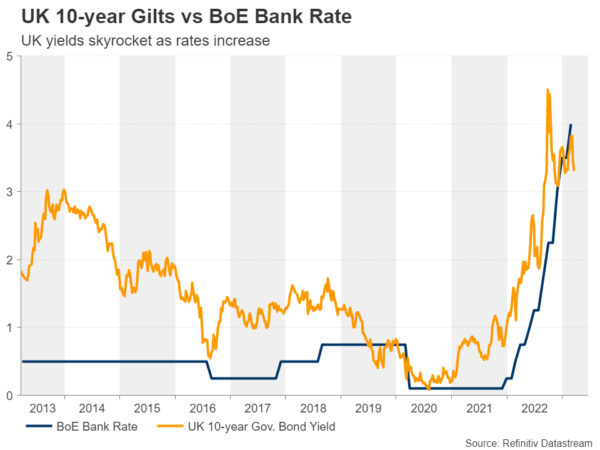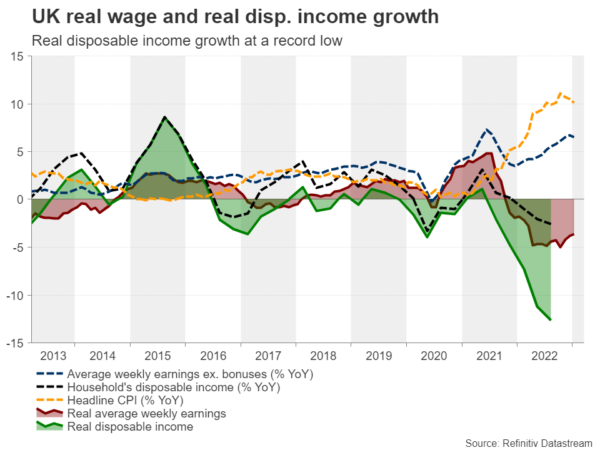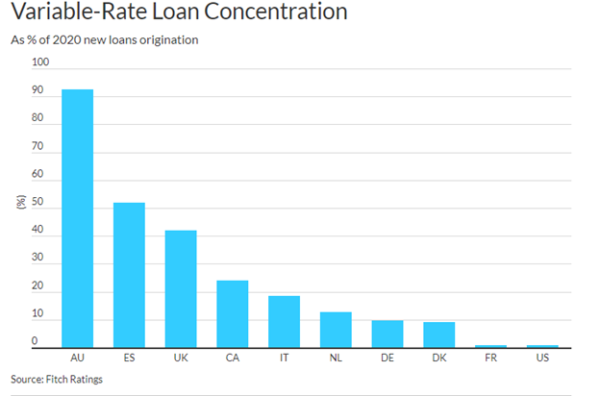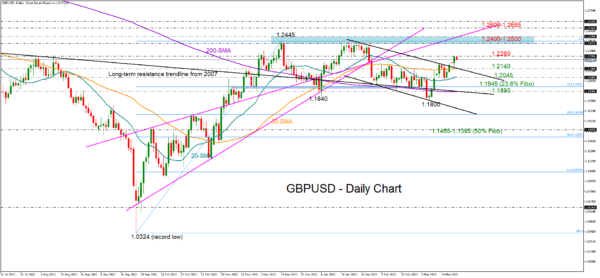The latest bank turmoil cast a dark cloud over the central bank community, forcing investors to downsize their rate projections just a week before the March policy announcements. In the UK, the Bank of England will probably deliver a softer quarter percentage point rate hike on Thursday at 12:00 GMT, and while that could theoretically help the British pound to recoup some lost ground, a potential pause to the hiking cycle could easily put a break on any sterling rallies.
Investors dial down rate expectations
The UK is not a stranger to financial stability threats. It was actually the first country to spook markets when the Bank of England (BoE) urgently stepped in to buy 65 billion pounds of long-dated government bonds at the end of September after an extensive sell-off in bonds sparked insolvency risks in pension schemes. The chancellor’s mini budget was blamed then for pressing investors’ confidence and slashing the value of government loans, but that instantly made investors wonder how transparent the risk management is and how close financial markets are to a cliff edge.
Two bank failures in the US and the panic created over a potential fallout of the systemically important Credit Suisse revived fears for a domino effect in the UK, squeezing the FTSE 100 stock index by 7.7% from a record high to a relatively lower post-pandemic level. On the other hand, the British pound managed to escape the freefall, although futures markets immediately dialed down their rate projections to price a 50-50 tossup between a pause and a 25 bps rate hike.
Inflation calls for additional rate hikes
The next test for the British currency will be the central bank’s policy announcement, with CPI inflation figures likely influencing rate hike expectations a day earlier on Wednesday. Forecasts expect the headline CPI to ease to 9.9% y/y from 10.1% previously and the core measure to inch down from 5.8% y/y to 5.7% y/y, both remaining well above the central bank’s 2.0% target for more than a year now. Under other circumstances, that alone could be enough reason to vote for a bold 50 bps rate hike, but policymakers will probably move forward with a smaller 25 bps rate increase to 4.25% even as inflation remains the elephant in the room.
During its previous policy meeting, the central bank highlighted that additional rate increases might be required if price pressures persist, but it dropped its language for a forceful response to inflation, raising speculation that the hiking cycle might be near to a peak. Apparently, the BoE is still far from declaring victory on inflation and abandoning its inflation mission would not be policy-wise at the moment. Therefore, a little more tightening would not violate the central bank’s guidance, while it would also restore some market confidence if policymakers avoid cautious signals.
It might be the last rate hike before a pause
Still, a call for a pause in monetary tightening could be on a knife edge as the global battered bond values threaten additional financial shocks. The UK could be among the victims too. Although the chancellor insisted that the UK banking system remains sound and well capitalized, and exposure to SVB and Credit Suisse is minimal, the latest financial stability report that was released in December underlined that the “UK’s foreign liabilities are significantly higher than for other G7 economies”. That could still make the economy materially vulnerable to external liquidity crunches under tighter global conditions, especially as the interconnection with non-traditional decentralized finance markets has become more complex.
Fundamentally, the economic picture is not great either, but it could still excuse another gentle rate hike before a period of rate stability starts. The economy narrowly avoided a technical recession at the end of 2022, while creating more jobs than analysts expected, with the unemployment rate remaining steady at 3.7% in January versus August’s 3.5% record low. Average hourly earnings remained stable near pre-pandemic highs, but bleak retail sales, which continued to contract for the tenth consecutive month in January, suggested that households are still feeling the squeeze in living standards.
Moreover, the UK’s property market is relatively more sensitive to rate increases after Australia and Spain, according to the Fitch rating agency, as it has the highest proportion of loans with variable or fixed rates that expire or reset within 24 months. Note that household-debt-to-disposable income has been trending down since 2008 but is still comfortably above 100%.
GBP/USD levels to watch
Turning to FX markets, a 25bps rate hike could extend the pound’s latest rebound, though perhaps temporarily if the BoE announces a pause in the hiking cycle, letting previous rate increases take their effect on the economy. Specifically, the BoE could argue that there are other tools which are responsible for maintaining financial stability as the ECB chief Christine Lagarde tried to convey when she said that there was no trade-off between financial and price stability last week.
Technically, pound/dollar will need to overcome the 1.2280 resistance for the bulls to speed up towards the crucial 1.2445 -1.2500 ceiling. A 25bps rate hike and a warning of possible additional rate hikes could assist cable to reach that point.
Otherwise, a cautious tone by the BoE and signals that the hiking cycle may not resume unless economic conditions allow, could press the pair back to the 1.2140 territory. Even lower, the pair may head for the 20-day simple moving average (SMA) at 1.2045. Failure to pivot here could shift the spotlight to the 1.1945-1.1890 region.
Note that the FOMC policy announcement and a vote on Rishi Sunak’s post-Brexit trade agreement are on the agenda on Wednesday before the BoE meets.




